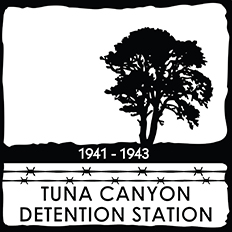Name: BOKUHEI TAKEUCHI Deceased 03/04/1987
MIYE, wife Deceased 09/11/1974
Ages of the Takeuchi family at the time of arrest were father 43, Mother 38 and 5 children: Miyoko 17, Takashi 16, Keiko 14, Tomoko 9 & Itsuko 3.
Occupation: Father was a gardener with customers in the Beverly Hills area. Mother managed an apartment house on Pico Blvd. where our family lived along with the tenants.
Arrest: It was Friday, the thirteenth; February 13, 1942. I was home from school that day due to an asthma attack. Two FBI men came in the morning asking for Papa. Several of Papa’s friends had been picked up earlier so Mama had enough presence of mind to say that he wouldn’t be home until seven in the evening. Then she spent the rest of the morning calling family friends to tell Papa to come home directly after completing his gardening route. (Papa had a habit of stopping by the nursery or at his friends’ house at the end of the day before coming home.) She packed a valise with a change of clothing and toiletries. Papa came home early enough to enjoy a bath and final meal with the family. Promptly at 7 o’clock, the same FBI men returned. The next time we saw Papa was behind a fence in Tujunga Canyon; a former work camp was used as an assembly center for the men.
On Evacuation: Family household items including Japanese artifacts (kimonos, dolls, and swords) were stored in the basement of the apartment house entrusted to the care of a tenant. Takashi and Miyoko had to negotiate the selling of the family car and other large items. We left for the Pomona Assembly Center in May; then to Heart Mountain, Wyoming in September. We went to Crystal City, Texas in June 1943. At the close of the war, Miyoko left for Cleveland, Ohio followed by Takashi and Keiko in Janauary 1946. Keiko joined Miyoko and Takashi went on to New York City. Our parents left several months later for Cleveland, Ohio, with the two youngest siblings, along with Kenji born in Crystal City. After enduring the harsh winter months of little work, our parents returned to Los Angeles with the two youngest in early 1947. The whole family finally reunited in late 1947 at a hostel in Venice, California. All family possessions left in the apartment basement had been sold or stolen.
HUMOUROUS INCIDENT IN LORDSBURG, NEW MEXICO
Papa told us that one night as his guard made their nightly bed checks in the barracks, this incident happened which made Papa the “talk of the camp.” Papa use to talk in his sleep (negoto), not quiet mutterings but out and out loud talking. How he produced such loud outburst which never awakened him, I’ll never know. Anyway, on this one particular night amid the gentle snoring of the men, Papa let out one of his vocal renditions which so startled the guard that he almost ran into a pot belly stove in his hurry to get out of the barrack. The commotion woke up the other men, but not Papa. Toni (Takeuchi) Tomita
The CRYSTAL CITY EXPERIENCE rings like an echo of a distant locomotive, it happened so long ago. The photos, lessons, and friendships we gained are the only viable proof that remain today. We were herded to this forsaken place in southern Texas to be a reunited family for the “duration of the war.” It was a time in our lives when tomorrow was an impossible dream. The passing of time has dimmed and mellowed our memories but one of the most indelible lessons that remains is how people coped with this situation. It was those with active minds, skills, or avocations in arts and crafts that found incarceration more tolerable than the rest. It was a learning mecca for the uninitiated; Mother was always busy during the prewar days, raising a family, managing a business, never taking time for herself. She liked poetry as a passing interest and would read whenever she could find the time. In camp, she developed a more serious interest in poetry under Dr. Mori, Ohta Sensei and other members. She spent many enjoyable hours creating her own works. Mother continued her poetry writing like an obsession after leaving camp. She joined clubs and subscribed to many publications here and abroad. On the eve of her naturalization, the flowering camellia tree in the backyard garden gave her the inspiration for a poem:
“Soshun no niwa no
Tsubaki ni Mukai tsutsu
Sabishimu”
It was about her ambivalent feelings toward giving up her roots to become a citizen of an alien country. This sentiment expressed the same feelings of other Issei going through the naturalization process. We were all pleasantly surprised to learn that her work was one of those selected in the 1956 New Year’s Imperial poetry contest in Japan. Her enthusiasm never waned and she composed and wrote “tanka” poetry until her untimely death in 1974. She left us with a rich legacy-from a talent she discovered those dark days. Tomorrow did come for most of us and oh, how sweet it was to have “freedom” again. My heart weighs heavily when I think of people who were not able to fulfil that dream. The adjustment to freedom had a price but for the survivors who finally found “shaba,” I truly believe our lives were enriched by the “Crystal City Experience.”
I personally feel very grateful and indebted to the many Sensei and friends who made this a meaningful chapter in our lives.
Takashi B. Takeuchi

